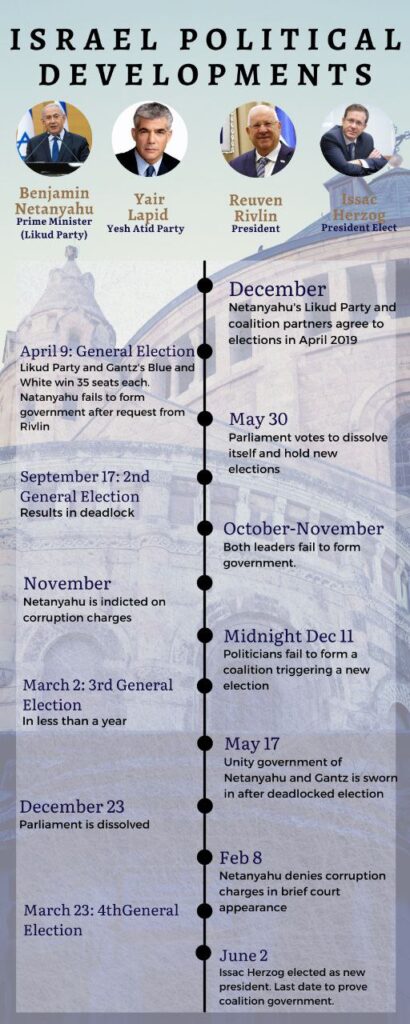The coalition of at least eight opposition political parties could oust Benjamin Netanyahu as a Prime Minister, amidst new political developments in the Jewish State.
Since 2019, Israel had four deadlock elections that failed to give a stable working majority to any party or a coalition in the Knesset, the Israeli Parliament. After recent polls in March 2021, although being a single largest party – Benjamin Netanyahu’s Likud party remained unsuccessful to form a working alliance within his camp.

Photo source: AFP
Naftali Bennett’s Yamina party who won only seven seats in a 120 seat Knesset became a kingmaker in Israeli politics. Last week, Bennett announced that he would work with opposition party leader Yair Lapid. Bennett in his address last Wednesday said- “he’s ready to work with new “change” government to prevent fifth round of election in the country.”
Israel could have a new Prime Minister in form of Naftali Bennett, if the opposition parties succeed in uniting coalition allies. Bennett asserted that “Netanyahu is no longer trying to form a right-wing government because he knows well that there isn’t one. I will do everything to form a national unity government with my friend Yair Lapid.”
But Prime Minister Netanyahu, popularly known as “Bibi” is not going down without a fight. He has now urged right-wing Knesset members to abandon Bennett’s camp. He accused Bennet of “misleading sentiments” of Israel people and carrying out “the fraud of the century.” If Netanyahu is able to side at least two-three lawmakers to his side, the prospective coalition could fall.
If the deal on table works out, a far-right religious lawmaker, Naftali Bennett is set to occupy Israel’s highest office for a fixed time before passing the baton to Yair Lapid.
Experts in the region have been divided over the real-time effects of the emerging political dynamics. Joyce Karam, senior correspondent, The National calls this a fresh page in Israel’s politics and a potential exciting news for Jordan, USA, Arab governments. According to Karam, regime change might invite legal problems for Netanyahu.

Dalia Dassa Kaye, former Director, RAND Center for Middle East Public Policy (USA) believes differently. She writes “Not sure Bennett as PM will be welcome news to Arab world/Biden/EU. He’s ideologically opposed to two states and favours annexation policies. Yeah, Israel’s Iran policies will remain unchanged.”
The new government is expected to be fragile, given mixed ideologies coming together with an aim just to unseat Benjamin Netanyahu, who now might be leading a strong opposition.
Meanwhile Issac Herzog has emerged as the winner in the Presidential election held today. Former head of Israel’s Labour Party, Herzog defeated educationist Miriam Peretz by a margin of 33 votes. The result has been declared certainly in a politically crucial times but won’t have any major impact on political developments as the term of the new President will begin in July.
As of now the opposition races with the midnight (June 2) deadline given by current President Reuven Rivlin, to submit formal coalition agreements and form new government. A failure to adhere to deadline means a 5th general election in 2 years.
Edited by: N.K. Jha


1 Comment
Short and yet exhaustive. Touches upon almost every other significant aspect of the story. Congratulations Husain